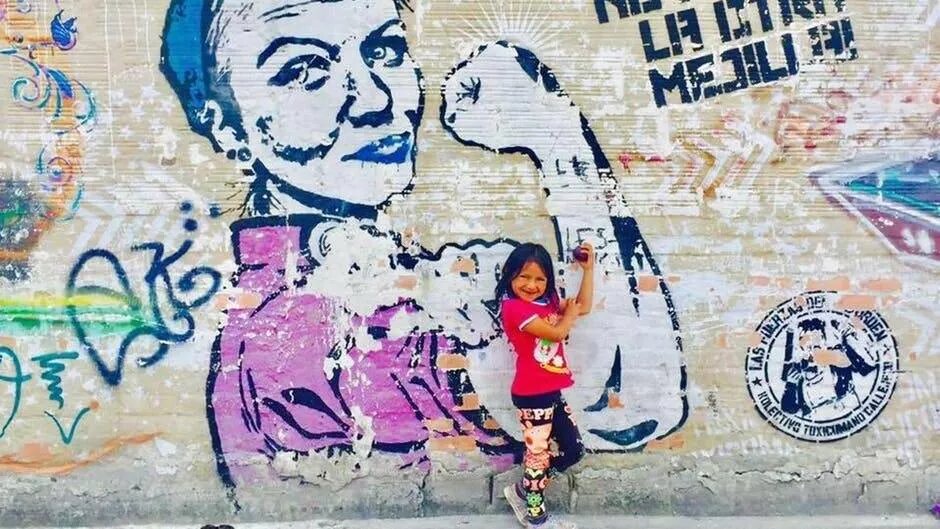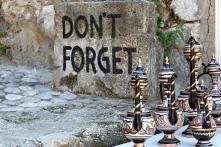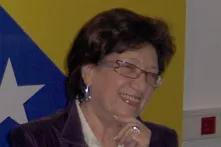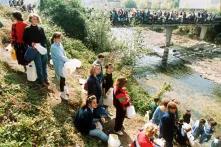Conservative values and patriarchal structures are increasingly gaining importance as right-wing populism grows stronger. According to the latest Global Gender Gap Report, we will need another 200 years before we achieve equality between men and women worldwide.

Women's power in the strongholds of the Patriarchate
Conservative values and patriarchal structures are increasingly gaining importance as right-wing populism grows stronger. According to the latest Global Gender Gap Report, we will need another 200 years before we achieve equality between men and women worldwide.
It's daybreak. Slowly the sun rises behind the hill and makes the mountain village appear in a golden glow. Apart from the sound of the stream and the bells of the cows grazing comfortably, hardly anything can be heard. One could almost think that the world is turning slower here.
In this Swiss idyll Nora lives with her husband, her two sons and her father-in-law under one roof. Nora's big wish is to be able to go back to work, just as she did before her marriage. Her husband does not support her. It is not appropriate for a woman to go to work. Nora should take care of the children and the household. The year is 1971. While in Zurich numerous women took to the streets to fight for equality between men and women, here the world still seems to be in order.
After the young daughter of Nora's sister-in-law goes to prison for unconventional behavior, Nora makes a decision: she no longer wants to accept that emancipation is seen as something that violates the divine order. Together with other women from the village, Nora travels to the city, takes part in demonstrations and advocates for the introduction of women's voting rights in her village.
Nora is the protagonist of the Swiss film "The Divine Order"[1], which focuses on the introduction of women's voting rights in Switzerland. The country depicted in the film is truly no paradise and shows how not only women, but also men and children suffer under the prevailing patriarchal structures.
Introduction of voting rights for women in Switzerland
For decades, women in Switzerland had to fight for the introduction of the right to vote. While after the Second World War women gained the right to vote in numerous European countries, women in Switzerland were not rewarded for their commitment. Swiss historian Heidi Witzig explains: "In contrast to other countries, Swiss men returned after military service, which meant that women had to resign as gap fillers. The Federal Council's first bill to introduce voting rights was rejected in 1959.[2] It then took another twelve years until the introduction of voting rights for women finally took place on 7 February 1971. "Since it was a people's (men's) vote, an enormous amount of persuasion was needed. In 1986, however, a new generation of young feminists from all over Switzerland stood by and gave a new impetus to the women's suffrage movement," said Heidi Witzig. The introduction of the right to vote and the right to vote was followed in 1981 by the inclusion of equality between men and women in the Swiss Federal Constitution.
And where does Switzerland stand today, almost 40 years after equality was enshrined in the constitution? According to historian Heidi Witzig, Switzerland has developed to a medium level. "The new marriage law is based on partnership, but the equal pay prescribed in the constitution has still not been implemented. The feminist collective aktivistin.ch[3] adds: "In recent years conservative and traditional values have regained their importance in Switzerland. At the moment, the collective is therefore endeavoring to fight to ensure that the rights won are not lost again. The collective also points out that the structural conditions in Switzerland are still hampering and slowing processes of change. "It is a challenge to develop common ideas beyond the cantonal borders and to convince society that we are still a long way from equality," the collective continues.
This assessment is also confirmed by the Global Gender Gap Report[4] of 2018. Switzerland ranks 20th out of a total of 149, after Bulgaria and South Africa. The report also shows that equality between men and women is stagnating worldwide. The World Economic Forum report compares 149 countries in four areas: Economic participation and equal opportunities, educational attainment, health and political self-determination. One of the main reasons are social values, which continue to be based on traditional role models and patriarchal structures. In Europe, such patriarchal structures and traditional role models are particularly widespread in the countries of South Eastern Europe. According to the Global Gender Gap Report, Albania ranks 34th, Serbia 38th, with Macedonia 66th and Montenegro 69th, just behind Bosnia and Herzegovina 62nd.
Bosnia and Herzegovina: Parallels with Switzerland in the 1970s
The current situation in Bosnia and Herzegovina is similar to that in Switzerland in the 1970s. Like Switzerland, Bosnia is a rural country. Especially in these rural areas, traditional values and patriarchal structures are still widespread. In addition, access to education for these women is limited and there are few opportunities for paid employment. "Young Bosnian women from rural areas therefore often see early marriage as the only chance to break out of these structures," says Vedrana Frasto of the feminist organization CURE[5].
Sara Velaga, a young Bosnian columnist who deals with the position of women in Bosnia, says: "The patriarchal structures are not only widespread in rural regions, we are also still a long way from equality in the cities. I myself experience situations in my everyday life in which I am discriminated against as a woman. What saddens me most is that there is a lack of solidarity between women. The competence of successful women is often questioned by the women themselves".
Many women in Bosnia are also still exposed to violence. Two days ago, the Organization for Peace and Co-operation in Europe (OSCE) published the results of a long-term study on violence against women in Eastern and South Eastern Europe. The study also interviewed women from Bosnia and Herzegovina. The results are sobering: The survey reveals that 70% of women interviewed experienced some form of violence since the age of 15, 31% of them in the last 12 months.[6] "Violence against women in Bosnia is indeed a major problem. Often the women concerned do not dare to talk about it or go to the police, and gender-specific violence is still not recognized as such," says Vedrana Frasto of the organization CURE.
Although Bosnia was one of the first countries in the region to adopt the Equality Act in 2003 and introduced an anti-discrimination law in 2009, according to the Alternative CEDAW Report[7] it lacks implementation. The proposals for constitutional amendments initiated by women's organizations are not dealt with by parliament, and since women hardly play a role in political discourse in Bosnia, they also have no voice at the political level to speak out against discrimination and for gender equality. Only 21.4% of women were represented in the national parliament in 2018. This is despite the fact that Bosnia has had a quota since 1998 which stipulates that each party list must contain at least 40% of the under-represented sex. There has been no president to date and only 22.2% of ministerial posts were occupied by women in 2018.[8] "The responsibility to change this lies clearly with the parties. It can't be that 50% of the population and their concerns are hardly represented in politics," says Jasmina Mršo, member of Nasa Stranka's Sarajevo Old Town Council.
In Bosnia and Herzegovina, therefore, almost all political decisions are made by men. However, this is not to the advantage of the country, which in many respects performs very poorly in international comparison: High unemployment, high air pollution in many cities and widespread corruption are just three examples of the political failure of the male elite in Bosnia and Herzegovina.[9]
The brave women of Kruščica[10]
Until recently, politics in Kruščica was also a purely male affair. But that changed in August 2017 when the village of Kruščica became the scene of a story of courageous women who joined forces to fight for their cause. Day and night the women guarded the bridge of their hometown to prevent the construction of two hydroelectric power plants and thus guarantee the preservation of the Kruščica river. Despite the intimidation by the police, the women remained steadfast and acquired the knowledge to fight the construction project with legal and political means.
Alma Midžić, who supports the women in their project, explains: "The inhabitants have shown that it is possible to organize and receive broad support, even in an ethnically divided area". The women were able to stand for local elections and thus became an active part of politics. In December 2018 the women had another success: The competent court declared the building permit for the two hydropower plants invalid.
If a woman wants it, everything stands still
Two countries, two stories. Stories of women from a rural environment who have come together without prior knowledge or interest in political processes and have successfully stood up for their cause.
Nora and her comrades decide to move back to a hotel for a few days, according to the motto: If a woman wants it, everything stands still. It was no different in Kruščica. While the women stood guard, the men had to do the housework themselves. In both cases, the strike made the men miss what they had taken for granted for too long. This made the central role of women in society visible and shook the prevailing balance of power. "The fact that women are on strike, not only at work but also at home, is a strong signal," says historian Heidi Witzig.
"The Swiss film "The Divine Order" and the women from Kruščica are two wonderful examples of women who have been able to make a difference in society together," says Andrea Vujošević, director of Cinema City in Sarajevo. She herself was awarded the Prize for Gender Equality by the Bosnian Parliament in 2016 for her commitment. "It is fundamental that women make use of their abilities and begin to work for a better future for Bosnia, not only in politics but also in other areas".
By Laura Meier for hbs
[2] https://www.parlament.ch/de/%C3%BCber-das-parlament/politfrauen/frauenst... (Retrieved 24.01.2019).
[4] WEF: Global Gender Gap Report 2018 (Retrieved 15.02.2019).
[6] https://www.osce.org/secretary-general/413423 (Retrieved 07.03.2019)
[7] http://hcabl.org/alternativni-cedaw-izvjestaj-izvjestaj-organizacija-civ... (Retrieved 15.01.2019).
[8] https://www.weforum.org/reports/the-global-gender-gap-report-2018 (Retrieved 05.02.2019).
[10] https://ba.boell.org/de/2018/04/03/kruscica-ein-kampf-fuer-uns-alle (Retrieved 05.02.2019).



